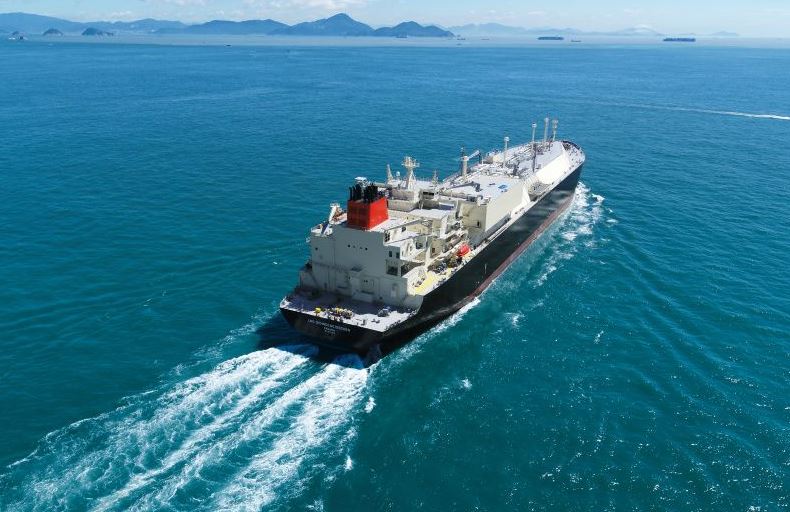Uniper said on Thursday that work has started on what it says is the first German LNG import terminal, as the country looks to cut reliance on Russian gas.
German Economy and Climate Change Minister Robert Habeck and other officials set the “first pile driving” for the construction of the LNG terminal in Wilhelmshaven, according to a statement by Uniper.
Uniper, as builder and operator of the terminal, would invest around 65 million euros ($68.8 million) in the facility.
In addition, in a symbolic act and in the presence of all contractual partners, a letter of intent (LOI) was signed for the chartering of two floating storage and regasification units (FSRUs), the firm said.
Uniper had optioned both FSRUs on the market for the federal government.
The company also said in the statement on Thursday that the federal government and the state of Lower Saxony signed a deal on the expansion of Wilhelmshaven into a “green energy hub”.
According to Uniper, the firm is supporting this project with its on-site projects – in the short-term in the form of the LNG terminal, and in the medium and long-term in the form of the Green Wilhelmshaven project.
The firm did not reveal any additional information regarding the FSRUs.
Four FSRUs from Hoegh LNG and Dynagas
Hoegh LNG revealed on Thursday it has signed two FSRU charter contracts with the German Federal Ministry for Economic Affairs and Climate Action. The firm did not provide details on the projects or the units.
German energy firm RWE, a shareholder in the planned Brunsbuettel LNG import terminal, confirmed in a separate statement it has signed the charter deals for two 170,000-cbm FSRUs with Hoegh.
The Lower Saxony government said in a sparate statement as well that one of the two Hoegh’s FSRUs would serve the facility in Wilhelmshaven and the other in Brunsbuettel from 2023.
Dyangas was also in talks with Germany for its two FSRUs, namely the 174,000-cbm Transgas Force and Transgas Power.
Germany signed charter deals on Thursday with Dynagas for two units, the Lower Saxony government said.
This means that Uniper signed the deals with Dynagas.
Location for these vessels include Stade, Rostock, Hamburg, or Eemshaven in the Netherlands, the statement said.
In March, the German government said Uniper and RWE were finalizing charter talks to secure three FSRUs for Germany, while the economy ministry mentioned the fourth unit as well in a recent progress report.
Germany said it would invest about 2.94 billion euros ($3.11 billion) in these FSRU developments.
The country currently has no large LNG terminals but it will build several facilities as it looks to slash reliance on Russian gas.
First phase
Uniper said the first phase of the Wilhelmshaven terminal provides for the regasification of LNG via an FSRU that would connect to the existing “Umschlagsanlage Voslapper Groden” (UVG) sea bridge.
There, the unit will regasify LNG and feed it into the German natural gas pipeline system.
For this project phase, the existing UVG has to be adapted and a connection between the FSRU and the onshore facilities has to be established.
Niedersachsen Ports GmbH & Co. KG (NPorts) will carry out the adaptation of the UVG in close cooperation with Uniper.
In addition, Open Grid Europe is building the connection to the natural gas pipeline system 28 kilometers away and thus also to the Etzel natural gas storage facility.
With a capacity of up to 7.5 billion cbm per year, the Wilhelmshaven facility would meet around 8.5 percent of Germany’s natural gas requirements in the future, it said.
Uniper expects the first phase to be ready by winter 2022/2023.
Ammonia plans
Uniper is also planning a second phase for the facility which should go online by 2025. The firm plans to add a permanent and expanded port solution for the FSRU in parallel to the existing UVG.
The plan is to provide additional unloading and handling facilities for green gases, e.g. ammonia, in order to be able to utilize the full potential of this new infrastructure project in Wilhelmshaven named Green Wilhelmshaven.
Uniper said it would transport the green ammonia directly by rail or convert it back into hydrogen on site via so-called crackers.
Also, the port infrastructure of NPorts and the Uniper-owned site enable the joint construction and operation of both the LNG and ammonia terminals, it said.
“Russia’s war against Ukraine has turned the world we live in upside down – this is especially true for the energy industry,” Klaus-Dieter Maubach, CEO of Uniper, said.
“We are doing our utmost to support the German government in its plan to diversify Germany’s sources of supply for natural gas and, in the long term, also for hydrogen,” Maubach said.

